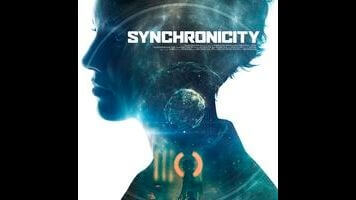A critic could spend a whole review cataloguing the films Synchronicity vaguely resembles; only summarizing the story would take longer. Visually, it’s a discount Blade Runner, creating a nameless, overcast metropolis—smudgy digital skyline, modern architecture subbing in for futuristic urban planning—to amplify its noir flavor. (A throbbing Moog soundtrack, augmented with stray blares of lonely saxophone, pushes that vibe further.) Our hero, played by Chad McKnight, is a physicist who’s learned how to punch a “traversable hole in the space-time continuum.” Unfortunately, powering the machine requires expensive materials, and his wealthy sponsor (Michael Ironside, looking like he’d take an exploding head over this gig, if presented with the choice again) wants to wrestle invention from inventor. The villain’s main weapon in this corporate takeover plot: a requisite femme fatale (Brianne Davis), whose motives may or may not shift as she gets deep into the seduction process.
For a while, everything about Synchronicity just seems off: Lines of dialogue drop like non sequiturs, relationships seem to develop inorganically, and the plot skips along at an unnatural pace, as though Gentry misplaced pages of his script and then just went ahead and started shooting without them. That’s all very much by design, however, and once the chronological backtracking begins in earnest—the same events replayed from different perspectives, key information filled in on the second go-around—every nonsensical encounter starts to make sense. It’s a nifty trick, at least on first viewing; to watch Synchronicity again is to impatiently wait for the characters to catch up to what the audience already knows.
Besides, the film’s rewind structure can’t account for all of the awkwardness, some of it courtesy of performances and dialogue less sophisticated than the plot mechanics they serve. McKnight, whose protagonist spends most of the movie jumping through hoops both figurative and metaphysical, evinces neither intense intellectual curiosity nor infatuation; he mostly just looks hung over. Davis fares worse, cast in the thankless role of a temptress whose actions are mostly dictated by the demands of the byzantine narrative. The conversation, meanwhile, aims for clever but frequently lands on clunky instead: When not quoting famous scientists or writers, the characters are delivering mouthfuls like, “If you want to finish this experiment that leads to the invention of time travel, then you, Mr. Beale, work for me.”
Time travel is such a metaphorically rich premise that movies about it sometimes gain a reflex resonance. It’s possible, at least while squinting, to read Synchronicity as a drama about romantic self-sabotage, in which someone creates the inevitable end of a relationship by trying to actively avoid it through jealous, paranoid scheming. But Gentry is too busy pushing puzzle pieces around, and orchestrating a string of “aha!” moments, to invest much in the love story at the center of his film. By the time the final string of big reveals arrives, adding yet another sci-fi wrinkle to the material, McKnight’s dazed scientist has become little more than a cog in the plot machine. (Even Primer, for all its chilly intellectualism, reserved a little time for character maintenance.) Synchronicity has an ambition uncommon to its threadbare ilk, and there’s something endearing about its B-grade stabs at near-future noir. But its human dimension is a lot like time travel itself: purely theoretical.


 Keep scrolling for more great stories from A.V. Club.
Keep scrolling for more great stories from A.V. Club.